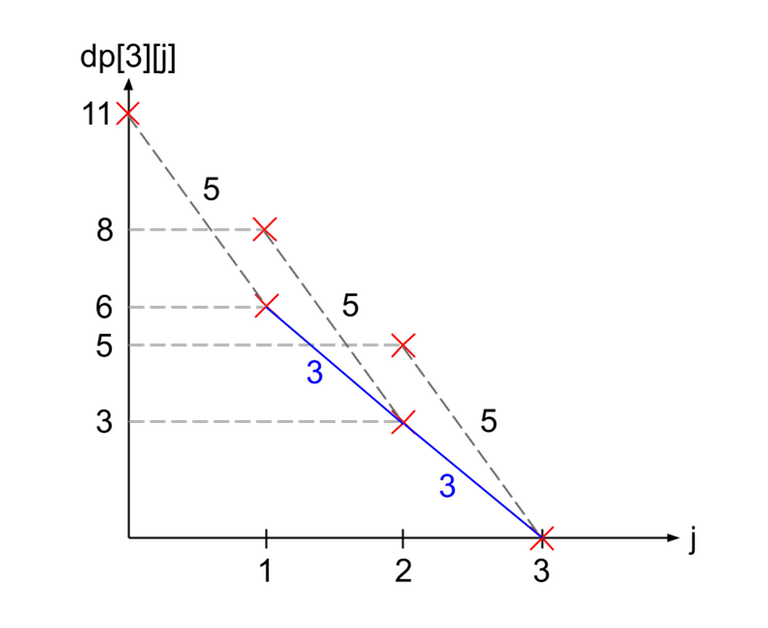Introduction
As mentioned in my previous blog, I will be writing a tutorial about slope trick. Since there are already many blogs that goes through the concept of slope trick, my blog will focus more on the intuition behind coming up with the slope trick algorithm.
Hence, if you do not know slope trick yet, I suggest that you read other slope trick blogs such as https://mirror.codeforces.com/blog/entry/47821 and https://mirror.codeforces.com/blog/entry/77298 before reading my blog. In the future explanation on the example problems, I will assume that the reader already knows the big idea behind slope trick but do not know how to motivate the solution.
When to use slope trick?
Most of the time, slope trick can be used to optimise dp functions in the form of $$$dp_{i, j} = \min(dp_{i - 1, j - 1}, dp_{i - 1, j} + A_i)$$$ or something similar. In this kind of dp functions, the graph of the dp function where the x-axis is $$$j$$$ and y-axis is $$$dp_{i, j}$$$ changes predictably from $$$i$$$ to $$$i + 1$$$ which allows us to store the slope-changing points and move to $$$i + 1$$$ by inserting and deleting some slope-changing points.
Sometimes, slope trick can also be an alternative solution to a greedy solution. The code will probably end up being the same as well, so sometimes slope trick can help you to find out the greedy solution instead. Personally, I find that slope trick is very helpful in this area as we do not have to proof the greedy since dp completely searches all possible states and is definitely correct.
Examples
Social Distancing
Abridged Statement
You are given a array of $$$n$$$ numbers $$$a_1,a_2,\ldots,a_n$$$. You want to select a permutation $$$p_1,p_2,\ldots,p_n$$$ of size $$$n$$$ such that the following cost $$$\sum\limits_{i=1}^{n-1} a_{\max(p_i, p_{i+1})}$$$ is minimized. Find the minimum possible cost.
Ideas
We can iterate from $$$i=1$$$ to $$$i=n$$$ and pick which position to put $$$i$$$. If you put $$$a_i$$$ directly adjacent to two earlier elements, it will contribute to a cost of $$$2a_i$$$. If you put it adjacent to one, it will contribute to a cost of $$$a_i$$$. Otherwise, if you put it by itself, it will not contribute to the cost.
For example, for the array $$$a = [1, 3, 5]$$$, we first place $$$a_1$$$ by itself as there is nothing else placed yet. Then, we can put $$$a_2$$$ by itself as well and finally we put $$$a_3$$$ in the middle of both of them, contributing to a cost of $$$10$$$. However, we can achieve a cost of 8 by putting $$$a_2$$$ next to $$$a_1$$$, contributing to a cost of $$$3$$$ and finally putting $$$a_3$$$ next to $$$a_2$$$, contributing to a cost of $$$5$$$.
We can think of the operations as the following. Combining two connected components incur a cost of $$$2a_i$$$, doing nothing incurs a cost of $$$a_i$$$, and adding a connected component is free. Hence, we can come up with the following dp.
$$$dp[i][j] = \min(dp[i - 1][j + 1] + 2a_i, dp[i - 1][j] + a_i, dp[i - 1][j - 1])$$$
Using the same array $$$a = [1, 3, 5]$$$, we have the following dp table where the cell in the $$$i$$$-th row and $$$j$$$-th column represent $$$dp[i][j]$$$.
| i\j | 1 | 2 | 3 |
|---|---|---|---|
| 1 | 0 | $$$\infty$$$ | $$$\infty$$$ |
| 2 | 3 | 0 | $$$\infty$$$ |
| 3 | 8 | 3 | 0 |
Solution
From the dp function, we can see that $$$dp[i]$$$ is just made up of 3 different copies of $$$dp[i - 1]$$$ shifted in different directions. This is often how slope trick looks like. Let us draw some graphs to see how the dp changes from $$$i - 1$$$ to $$$i$$$.

Let us see how we can obtain the graph of $$$dp[i]$$$ from $$$dp[i - 1]$$$. From the recurrence relation, we can see that $$$dp[i]$$$ is obtained by taking the minimum of the following 3 graphs: $$$dp[i - 1]$$$ shifted 1 to the right, $$$dp[i - 1]$$$ shifted $$$a_i$$$ upwards, and $$$dp[i - 1]$$$ shifted 1 to the left and $$$2a_i$$$ upwards.







